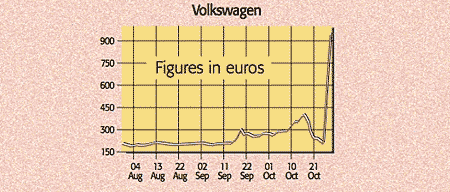
“I have had hedge-fund managers literally in tears on the phone,” a London-based car analyst told the FT. Hedge funds are thought to have lost €20bn-€30bn after bets that shares in German car maker Volkswagen would fall went badly wrong. They had sold short (borrowed and sold, in the hope of profiting by buying back at a lower price later) almost 13% of the firm’s shares. But last Sunday, Porsche, which had signalled in spring that it was unlikely to increase its control over VW, disclosed that it controlled not just 35% of the group, but 74% – an equity stake of 43% and the rest in options.
Hedge funds scrambled to cover their short positions, and because the free float is so small – the German state of Lower Saxony holds 20% – the rush sent the shares rocketing. It rose fivefold in little more than a day; on Tuesday, VW’s market capitalisation briefly exceeded Exxon Mobil’s, making it the largest company in the world. On Wednesday the price fell as Porsche sold some shares to increase the free float.
Porsche has been accused of manipulating the market. German market overseers “look inept”, said John Foley on Breakingviews. Porsche wasn’t obliged to reveal its activities in the options market, so other investors are left “largely in the dark”, said the FT. In this case, added Jeremy Warner, the fact that it ill-behoves the secretive hedge-fund industry to moan about transparency “is neither here nor there”.